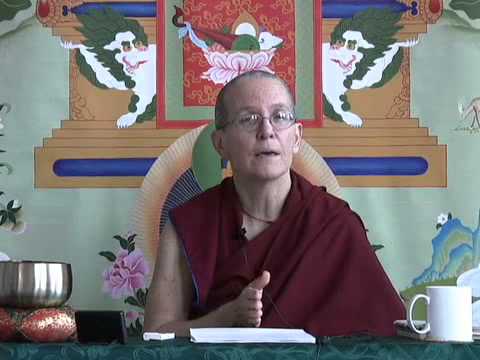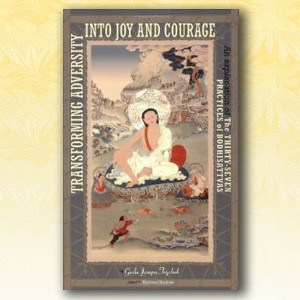Verse 41: Praising the Buddha
Part of a series of talks on the 41 Prayers to Cultivate Bodhicitta from the Avatamsaka Sutra (the Flower Ornament Sutra).
- The meaning of the Buddha’s crown protrusion
- Rejoicing when others create merit by praising or prostrating to the Buddha
- The value in praising the Buddha
41 Prayers to cultivate bodhicitta: Verse 41 (download)
We are on the 41st of the 41 prayers of the bodhisattvas of the Avamtamsaka Sutra and it says,
“May the crown of the head of all beings be seen (as that of the Buddha) by all the world and the gods.”
This is the prayer of the bodhisattva when seeing someone bowing down.
You’ll notice on all of the thankas, and all of the statues of the Buddha, that the Buddha has a top-knot. It is a fleshy thing. It’s not hair. It is covered by hair, but is said to be fleshy although the Buddha has a body of light. It is symbolic of the incredible amount of merit that the Buddha collected for three countless great eons, that served as the cause to become a fully enlightened being. When we see other people bowing down, we should think, may they too come to have that kind of merit, which comes to act as a basis for the wisdom of the Buddha. In other words, may all of these sentient beings, who pay homage to the Buddha, may they have the body, speech and mind of the Buddha. This is the prayer of the Bodhisattva when seeing someone bowing down.
Whenever people come to the Abbey and go to the meditation hall and bow down, or in the evenings when you’re doing the 35 Buddhas and you’re bowing and watching each other bow, you should think, “May the crown of the heads of all beings be seen as that of the Buddha by the world and the gods.” Think that and really rejoice that others are bowing. Rejoice that they’re praising the Buddha, physically, verbally, and mentally, or bowing to the Buddha physically, verbally, and mentally. The physical prostration you see. The verbal one is saying the names of the Buddha. The mental one is imagining the buddhas and also thinking of their qualities. We should do that ourselves and then rejoice when we see anybody else doing.
I was thinking about that. What’s the value of praising the Buddha? I don’t know about you, but when I grew up, my religion of origin was praising god and I never got into it. I don’t know. I didn’t find that inspiring. I have to really think about what’s the use of praising. When I think of it, praising is useful for the people that praise me but beyond that, my egoistical mind doesn’t get very far. What’s the use of praising? Well, it turns our mind to see others good qualities and so generates the wish to develop those good qualities ourselves. Also when we praise others—whether it’s an object of refuge or an ordinary being—when we praise others our minds fills with gladness and hope and optimism because we see that there are good qualities in the world. Here we really see how distorted jealousy is, because jealousy is the mind that says, “Everybody should praise me, not praise the buddhas and the bodhisattvas, let alone sentient beings.” How painful that mind of jealousy is. Thinking, “No I should have it, I should have it,” and how that mind makes us really rather discouraged, doesn’t it? When we can really see that others have worked a long time and spent a lot of time and energy cultivating these good qualities, then we can notice and take that as an object of support for our own practice. It makes the mind very happy and it makes it optimistic and those are good conditions for practicing. I think it’s for that reason that they say that offering praise, and offering prostrations and so forth, creates so much merit. Not because the Three Jewels enjoy it, but because of the effect it has on our mind, to make our mind more receptive and more open.
With that we have concluded the 41 praises. We always start at the beginning.
“May I lead all sentient beings to the citadel of liberation.”
This is the prayer of the bodhisattva when entering a house.
We forgot that one didn’t we?
“May all sentient beings attain the dimension of reality of a Buddha.”
This is the prayer of the bodhisattva when going to sleep.
“May all sentient beings realize the dreamlike nature of things.”
This is the prayer of the bodhisattva when dreaming.
May we remember all of these and practice them.
Venerable Thubten Chodron
Venerable Chodron emphasizes the practical application of Buddha’s teachings in our daily lives and is especially skilled at explaining them in ways easily understood and practiced by Westerners. She is well known for her warm, humorous, and lucid teachings. She was ordained as a Buddhist nun in 1977 by Kyabje Ling Rinpoche in Dharamsala, India, and in 1986 she received bhikshuni (full) ordination in Taiwan. Read her full bio.


